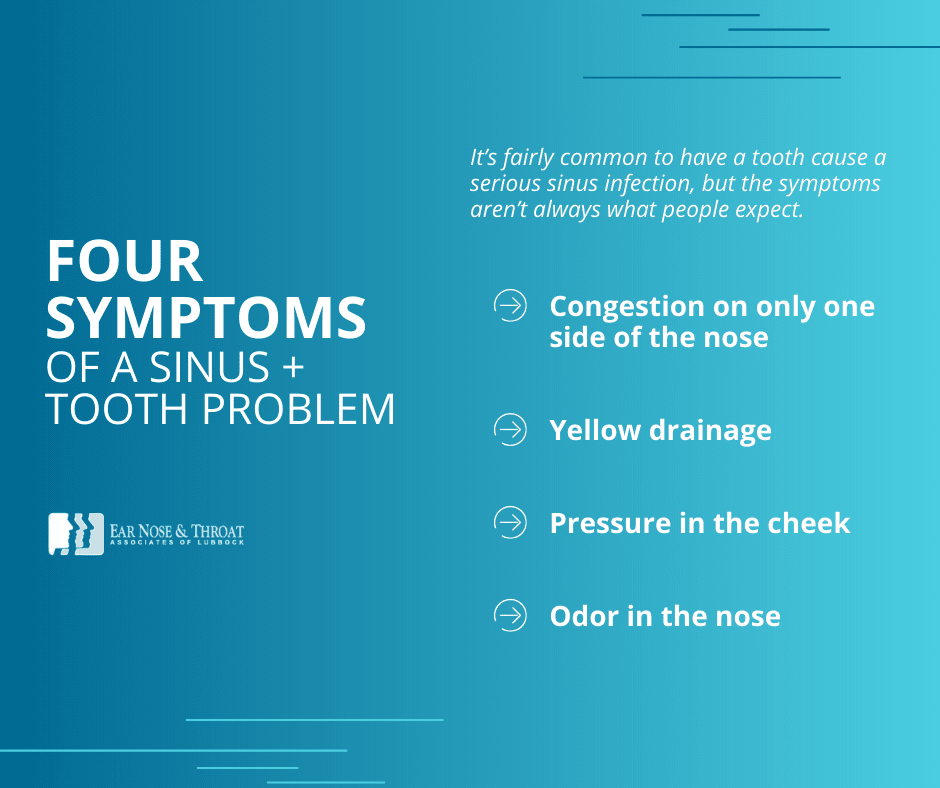How to Tell if Your Tooth Extraction is Causing Your Sinus Problem

Recovering from a tooth extraction is quite a process. You have to carefully navigate what to eat, how to drink, and how much activity you should do as you allow your body to heal. But you also may need to pay attention to how your sinuses are reacting, especially if you had upper molars removed.
A sinus infection after tooth extraction occurs most commonly when the maxillary molars are removed. These upper teeth in the back project into the sinus cavity. When you need any of these teeth extracted, or if you have an infection or cavity in a maxillary molar, you may notice your sinuses react.
Infections can spread from the mouth to the sinuses for several reasons. For some, a cavity may extend into the center of the tooth — which holds the tissue that connects it to the root. This decay then spreads into the sinuses and causes an infection. Other people may develop an abscess at the base of the tooth. When it’s in the right location, the bacterial infection can spread to the sinuses.
A sinus infection after tooth extraction can also occur because a connection between the mouth and sinus cavity was opened.
If you’re dealing with a sinus issue after dealing with a dental issue, the two problems may be connected. Here’s how to tell:
Symptoms of a Sinus + Tooth Problem
It’s fairly common to have a tooth cause a serious sinus infection, but the symptoms aren’t always what people expect. Many people come in because they feel tooth pain along with their sinus symptoms. But tooth pain doesn’t necessarily indicate the sinus infection is from a tooth.
The most common complaints of those with a sinus infection after tooth extraction are:
- Congestion on only one side of their nose
- Yellow drainage
- Pressure in the cheek
- Odor in their nose
Dental infections are created by something called anaerobic bacteria — they don’t need oxygen, but they have a pungent odor. Patients typically report a strong smell that never seems to leave.
Also, these infections are often one-sided and isolated to an area above the teeth that caused the dental issue. If an X-ray shows that only the sinuses above these specific teeth are involved, the source is often a dental infection.
Interestingly, tooth pain isn’t typically a symptom. When the tooth is infected to this extent, the root dies and you don’t feel pain.
Instead, those with a link between their tooth and sinus issues might have a dental history of a crown on the tooth, cracked tooth, or deep filling. When we do the CT scan, we’ll see an abscess at the base of the tooth. If the tooth is extracted, the CT scan will show a connection between the sinuses and the mouth.

How to Treat a Sinus + Tooth Infection
We typically begin treatment with antibiotics. However, once there’s an infection from the tooth in the sinuses, it’s difficult to eradicate with antibiotics alone.
If antibiotics are ineffective, a person may need to have surgery to open and drain the sinuses.
Additionally, they may need a root canal on the tooth to remove the abscess or a surgical repair to close the connection between the mouth and nose.
How to Distinguish a Tooth Problem from a Sinus Problem
It’s really difficult to identify if dental and sinus problems are related on your own. Sinus infections and allergies can cause tooth pain. Dental problems can trigger sinus problems. Some people have dental pain due to a bad tooth. After the tooth is pulled, they still feel pain because there’s an underlying sinus infection.
To distinguish between the two often takes a good ENT doctor. We’ll ask questions to understand your sinus and dental history, examine your sinuses with a scope, and use a CT scan (typically in-office) to get a better picture of what’s happening.
Related: What Does An ENT Do At Your First Appointment?
In fact, that’s where our expertise is — distinguishing between anatomic, allergy, sinus, and dental problems. These issues have many of the same symptoms. In order to find the real issue, we look at a patient’s history, conduct an exam, and interpret the CT scan to put together the reasons for the problems.
People who don’t get better, and still have the same symptoms recur, need an accurate diagnosis. Only then, can we really treat the symptoms in a way that will actually work.
How to Avoid a Sinus Infection After Tooth Extraction
After your extraction, the dentist will typically alert you if they see the potential for a problem to occur that would result in a hole between your mouth and sinuses. As a precaution, avoid forcibly blowing your nose so you don’t open a connection after your tooth extraction. If you blow your nose and feel air escape in the mouth, you know there’s a connection. If a hole opens up, it may have to be surgically closed.
Sinus problems can cause dental pain… and dental problems can cause sinus pain. There are a lot of nerves in the same area, and they present with many of the same symptoms. Whether you suspect a dental or sinus issue is at the root of your discomfort, an ENT will be able to help you move forward on your road to recovery.
Dr. Scolaro is a board-certified Otolaryngologist servicing the South Plains area. He has been practicing in Lubbock since 1990 and has earned a reputation as a skilled and experienced surgeon. He currently serves as the Medical Director for Covenant High Plains Surgery Center campuses, is a member of Covenant Health Partners and is an adjunct faculty professor for Texas Tech University Health Sciences Center School of Medicine. Learn more about Dr. Scolaro.
Categories:








